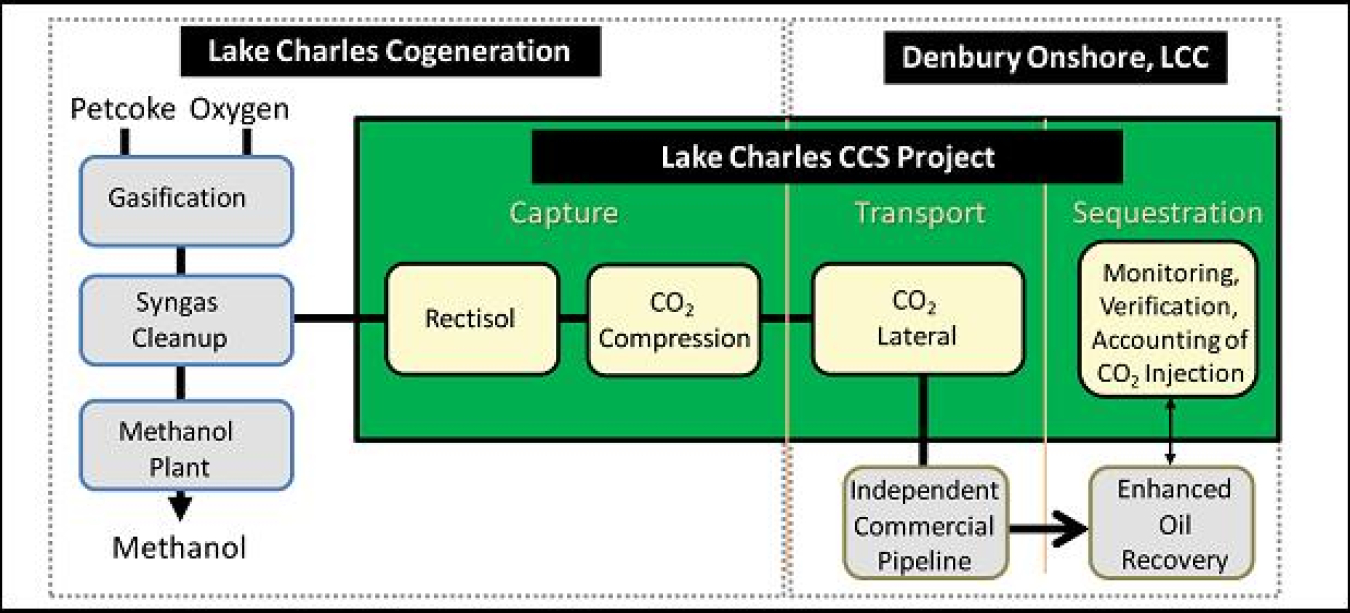
LAKE CHARLES CCS PROJECT
In October 2009, DOE selected the Leucadia Energy, LLC team to initiate one of 12 projects in Phase 1 of its Industrial Carbon Capture and Storage (ICCS) program. DOE again selected the project in June 2010 as one of three projects to receive continued (Phase 2) funding. In total, DOE provided approximately $261 million in financial assistance to the Lake Charles Carbon Capture & Sequestration (Lake Charles CCS) project from the Recovery Act of 2009.
The Lake Charles CCS project was intended to demonstrate the capture of CO2 from an industrial facility for use in an independent enhanced oil recovery (EOR) application. The industrial source of CO2 was designed to be a new petroleum-coke-to-chemicals (methanol and other by-products) gasification plant developed by Lake Charles Clean Energy, LLC (Leucadia Energy, LLC affiliate) in Lake Charles, Louisiana.
TIMELINE
DRAFT EIS ISSUED
On May 14, 2013, the Department of Energy released the draft Environmental Impact Statement for the Lake Charles CCS project for public comment.
FINAL EIS ISSUED
On November 14, 2013, the Department of Energy released the final Environmental Impact Statement for the Lake Charles CCS project for public comment.
RECORD OF DECISION ISSUED
On January 10, 2014, the Department of Energy issued the Record of Decision for the Lake Charles CCS project.
CURRENT STATUS
On September 24, 2014, Leucadia Energy, LLC informed DOE that they would not pursue the main petcoke-to-methanol project, and as such could not host the proposed CCS project. Leucadia has submitted the Final Report and all required technical reports for the project.
On December 21, 2016, the US Department of Energy announced a $2 billion loan guarantee to Lake Charles Methanol project, which will leverage upon the work and experience gained from the earlier Leucadia Energy project.
<p><a href="https://www.facebook.com/FossilEnergy" target="_blank">[[{"type":"media","view_mode":"media_large","fid":"584651","attributes":{"alt":"Fossil Energy on Facebook","class":"media-image caption","height":"83","style":"WIDTH: 42px; HEIGHT: 50px","typeof":"foaf:Image","width":"69"}}]]</a><a href="https://www.twitter.com/fossilenergygov" target="_blank">[[{"type":"media","view_mode":"media_large","fid":"584656","attributes":{"alt":"Fossil Energy on Twitter","class":"media-image caption","height":"83","style":"WIDTH: 43px; HEIGHT: 50px","typeof":"foaf:Image","width":"71"}}]]</a><a href="/node/921931" target="_blank">[[{"type":"media","view_mode":"media_large","fid":"584661","attributes":{"alt":"Sign up for NewsAlerts","class":"media-image caption","height":"83","style":"WIDTH: 45px; HEIGHT: 50px","typeof":"foaf:Image","width":"75"}}]]</a><a href="/node/624156">[[{"type":"media","view_mode":"media_large","fid":"584666","attributes":{"alt":"Fossil Energy RSS Feeds","class":"media-image caption","height":"83","style":"WIDTH: 40px; HEIGHT: 50px","typeof":"foaf:Image","width":"67"}}]]</a><a href="http://www.flickr.com/photos/79173425@N03/sets/" target="_blank">[[{"type":"media","view_mode":"media_large","fid":"585736","attributes":{"alt":"NETL's Flickr Photostream","class":"media-image caption","height":"67","style":"MARGIN: 1px 5px; WIDTH: 42px; HEIGHT: 42px","typeof":"foaf:Image","width":"67"}}]]</a></p>

